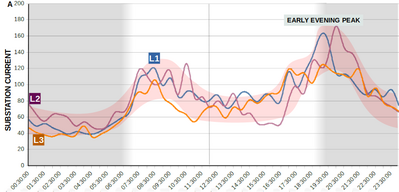All your heat pump problems solved by -- a plate heat exchanger in a plinth!
The cut away appears to shows that its a plate heat exchanger built into a plinth. Targeted at social housing (ie those who can least afford a 15%-30% uplift on their running costs) and presumably institutional purchasers who heven't got a scooby.
The voiceover to the advert on the website appears to make multiple assumptions about 'traditional heat pump systems' that hardly anyone here would make, in order to 'justify' the product. Apparently this will perform the magic of not requiring radiator replacement. Obviously a parallel universe where the laws of thermodynamics dont apply.
Isn't free market capitalism wonderful!
4kW peak of solar PV since 2011; EV and a 1930s house which has been partially renovated to improve its efficiency. 7kW Vaillant heat pump.
It seems to be saying that by separating the systems, then glycol usage can be reduced.
I've heard about maintenance issues with anti-freeze valves, so maybe for social housing they prefer glycol... I'm only guessing here.
Certainly from my house I'm looking at a plate heat exchanger as my old pipework probably won't hold 3 bar.
Certainly from my house I'm looking at a plate heat exchanger as my old pipework probably won't hold 3 bar.
I'm not sure that makes any sense at all, so I would question whoever is telling you this properly to examine the alternatives.
Fundamentallly the pressure you need in the system is determined by the radiators/pipework. You basically need enough to ensure it's never negative. A phe won't change this!.
Now you might argue that by pumping slower on the secondary and thus having a greater DT on the secondary than on the primary, you can reduce the dynamic pressure drop and hence the max pressure.. However if you are going to do this it will raise the required ft in the secondary and thus necessarily also in the primary. Given say a 5C drop through the phe added to this, you would almost certainly be bette accepting a higher DT at the heat pump and eliminating the phe.
Bad and Ill conceived decision I suspect, but of course extremely convenient for the installer.
In short, I don't currently believe the argument for a phe in the situation you describe. I'm open to being convinced, but I think you should be challenging whoever is telling you that you need one to work through the full argument, rather than do the easily thing which will almost certainly increase your running costs by 15%. I would bet a tenner that they can't but stress I'm happy to be proven wrong.
4kW peak of solar PV since 2011; EV and a 1930s house which has been partially renovated to improve its efficiency. 7kW Vaillant heat pump.
@jamespa nothing to do with the needed pressure.
Current pipework is likely 60 years old, buried in concrete and as such in an unknown condition. Current vented system would max out at 0.5 bar in the concrete floor.
As far as I can tell, most heat pumps require a minimum of 0.5 bar, and in normal operation range between 1-1.5 bar, with a pressure relief valve at 3 bar.
As all floor coverings are more valuable than pipework, it's not sensible to hope the pipework may withstand up to 6x pressurization over current expectations. The financial losses from not having a PHE are greater than having one.
Posted by: @scalextrixAs all floor coverings are more valuable than pipework, it's not sensible to hope the pipework may withstand up to 6x pressurization over current expectations. The financial losses from not having a PHE are greater than having one.
Understood.
The only point I am making is that I'm far from sure that a PHE fundamentally reduces the pressure required in any given system for any given level of performance, in fact I can't see how it possibly can do so.
Of course it's possible, perhaps even likely, that heat pumps, and indeed boilers, unnecessarly enforce a minimum pressure, and so you need to sheild some or all of them (it will be manufacturer dependent) from reality, by interposing a phe. However so far as I can see this would be (a) technology independent, (b) artificial (IE a function of the control electronics not actually required by any physics) and (c) necessarily performance neutral or more likely detrimental.
From an installer point of view system separation is extremely convenient, which is doubtless why we see it more than perhaps we should even though it almost invariably compromises efficiency.
As long as you are aware of the trade offs and the factors likely to motivate installers then you are making an informed decision, which is perfectly fine and indeed very much yours to make.
4kW peak of solar PV since 2011; EV and a 1930s house which has been partially renovated to improve its efficiency. 7kW Vaillant heat pump.
Posted by: @jamespaartificial (IE a function of the control electronics not actually required by any physics)
Yup, I see no reason to artificially pressurize low temperature heating technology, but as far as I can see that's the method most Heat Pumps follow. Higher temperature systems can kettle, and in that case I see the point of system pressure to keep the water from doing so and reducing efficiency.
Posted by: @scalextrixYup, I see no reason to artificially pressurize low temperature heating technology, but as far as I can see that's the method most Heat Pumps follow
I suspect it's nothing more than convention. The industry has moved away from open vented systems generally and newer boilers/heat pumps probably just reflect this as an assumption.
My Vaillant heat pump has an electronic pressure sensor, I have yet to find out whether the machine gets upset if the pressure drops below some (so far as I know unspecified) threshold. It's currently at 0.9bar, and has been slowly falling since it was installed. I think this is because of build up of detritus in the mag filter rather than a leak, because the fall only manifests itself when the water pump is running, indicating that it's a dynamic effect not a static one.
4kW peak of solar PV since 2011; EV and a 1930s house which has been partially renovated to improve its efficiency. 7kW Vaillant heat pump.
@jamespa I hope I'm wrong but I suspect you will get an error code if it gets too low.
Vented systems are so much simpler, it would be nice if heat pumps just had a vented system mode.
EH? so this is a water to water primary to secondary plate heat exchanger, [PHE] buried in a unit to sit under the DHW tank. So it compels every installation to have a secondary circulator pump regardless of whether it is necessary, as it hydraulically separates the circuit into primary and secondary sides. It introduces a avoidable hydraulic head loss - it's a plate heat exchanger - the most hydraulically restrictive type. It will lower thermal efficiency and cost the homeowner more to run the heat pump as the primary circuit will always have to run at a higher temperature than the secondary circuit design temperature. Say the secondary circuit is designed to run at 50degC flow for existing radiators, the primary will have to achieve 53degC to achieve 50degC flow in the secondary. What a load of thermodynamic bollox. It has mechanical joints on the PHE that, when installed, are absolutely impossible to access. No thanks, I'll skip.
Seems a convenient product for shoddy installers quite frankly, as they can avoid pressure testing or modifying the existing heating circuit and radiators, draining it off fully, flushing it out, etc. Never mind the 20 years of sludge in the system, it'll just clog up the PHE in the Heat Saviour rather than the ASHP.
Poor product IMHO
Some context to the argument if you are a Housing Association maybe?
The government’s Boiler Upgrade Scheme (BUS) currently offers homeowners, private landlords and small businesses grants of up to £7,500 to replace gas boilers with heat pumps.
However, housing associations are excluded from this funding, making it even harder for them to decarbonise their housing stock.
Given the scale of the challenge, should the BUS be extended to social housing? And what additional support do housing associations need to achieve a just and effective transition?
HA’s can lead the way to a fair and effective transition to low-carbon heating.
Social housing and the net zero challenge
The UK’s social housing sector is home to over four million households, many of whom are among the most vulnerable to fuel poverty.
Over the years, HAs have embraced renewable energy technologies – installing solar panels, heat pumps, biomass boilers, and district heating schemes.
This proactive approach has not only cut carbon emissions but has also reduced reliance on expensive and inefficient heating systems, improving comfort for tenants and helping to tackle fuel poverty.
However, the vast majority of social homes still rely on gas boilers. With heat pumps seen as the primary low-carbon alternative, housing associations face a difficult financial and logistical task in replacing them at scale.
Unlike private homeowners, HAs cannot spread the cost over long-term property value increases, meaning every investment must be carefully balanced against affordability for tenants and long-term asset management.
Joe Bradbury
Digital editor of Housing Association magazine (10 February 2025)
Posted by: @iaackGiven the scale of the challenge, should the BUS be extended to social housing? And what additional support do housing associations need to achieve a just and effective transition?
HA’s can lead the way to a fair and effective transition to low-carbon heating.
I agree with you,
and thank you for posting that quotation from the Housing Association magazine.
Not only are HA occupants the most vulnerable to fuel poverty, but they also account for the majority of pre-payment meters and don't have Time-of-Use tariffs.
Consequently, they are more likely to contribute to the national 'Early Evening Demand Peak'...
... and it's that which is driving the need to upgrade grid capacity,
for which we all pay through higher charges.
Taking all of that into account, I'd like to see HA's incentivised to install heat-pumps which are supplied with power via (off-grid) storage batteries.
The battery could also feed other in-home appliances, but not re-export to the grid.
That approach would allow all those homes to take no power at all from the grid during the Early Evening...
... which results in the Demand Peak being reduced...
... and the justification for massive grid upgrades being quashed.
Not only would we all benefit from lower bills, but those tenants would make sufficient savings to alleviate the pressure of fuel poverty,
pay off any outstanding arrears,
and get rid of the prepayment feature on their smart meter.
What's not to like?
Save energy... recycle electrons!
- 26 Forums
- 2,158 Topics
- 47.4 K Posts
- 14 Online
- 5,736 Members
Join Us!
Podcast Picks
Latest Posts
-
RE: Solar Thermal DHW and ASHP
Since you already have the ashp it makes little financi...
By Judith , 7 hours ago
-
RE: Heat Pump SCOPs – The Truth Might Not Be What You Think
I think you’ll find it depends on the room heat loss. A...
By Judith , 7 hours ago
-
DESNZ doing a survey which asks the right questions!
DESNZ have engaged ICF to do a survey of people who hav...
By Judith , 8 hours ago
-
RE: Can you help with our research: solar panels, EV chargers, home batteries, heat pumps?
Just done your survey!
By Judith , 8 hours ago
-
RE: Vaillant aroTherm Plus 10kW thoughts?
@realevil Fwiw I have the 7kW model with which I'm, ver...
By JamesPa , 9 hours ago
-
RE: A Customer's Lessons Learnt from a Heat Pump Installation in a Large House
@grahamf you appear to value your recirculating loop de...
By Judith , 9 hours ago
-
RE: Failing heat pump system - seeking thoughts on a rebuild
@cleardene-ashp just thinking about your issues here. Y...
By Judith , 10 hours ago
-
RE: Midea ASHP – how to set weather compensation
@cathoderay OK let's wait and see, it sounds an interes...
By Tasos , 12 hours ago
-

RE: What is the Heat Geek Guarantee?
@judith, I’m with you on Heat Geek, but there really do...
By Mars , 13 hours ago
-
RE: Electricity price predictions
Community energy installations are a great idea, but th...
By Scalextrix , 2 days ago
-
Inventor (Midea) Heat Pump short cycling advice
Hello, I have a Inventor (Midea) 8kW with a 800meters Φ...
By immunity , 2 days ago
-
RE: New Vaillant aroTherm Plus in black - When will it come to the UK?
Ooh, heat pumps in neon blue wrap 🤣 🤣 &...
By Old_Scientist , 2 days ago
-

@profzarkov Good to know in case it ever happens to me...
By bontwoody , 3 days ago
-
RE: Are Octopuses Slowing Consumer Adoption of Heat Pumps?
I mean, is this surprising? The local installers in my ...
By Alex , 3 days ago
-

@old_scientist sorry, I should have made it clear that ...
By GrahamF , 3 days ago
-

RE: Mitsubishi Ecodan 11kw Defrosting Issue.
@thundermink can you provide photos to illustrate your ...
By Morgan , 3 days ago
-
RE: Boiling Mad: Exposing Radiatorgate
Hi @Rob, I’d be more than happy to contribute. I have ...
By DREI , 3 days ago
-

RE: Solar Power Output – Let’s Compare Generation Figures
@andris a great year - very happy with our system
By Profzarkov , 3 days ago






